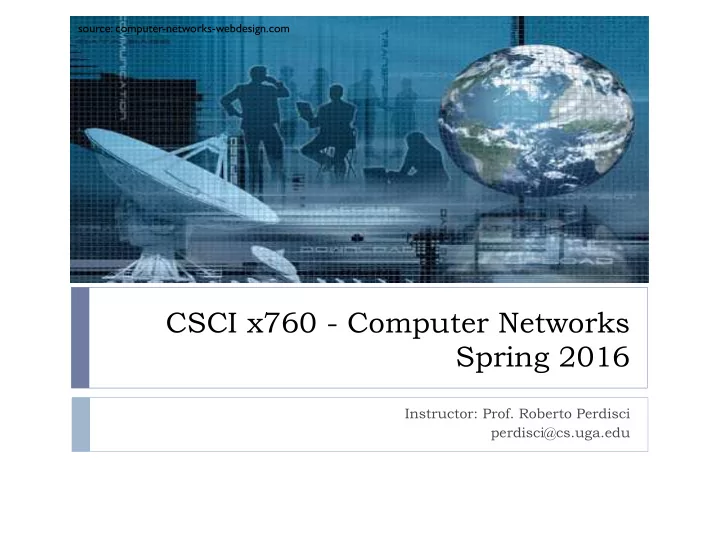

source: computer-networks-webdesign.com CSCI x760 - Computer Networks Spring 2016 Instructor: Prof. Roberto Perdisci perdisci@cs.uga.edu
CSCI 4760/6760 } What is the purpose of this course? } undergrad-level computer networks course } Focuses on understanding how the Internet works: } How do Internet nodes communicate with each other? } What are the network protocols that make this complex interconnection of computer networks exchange data in a reliable way? } We will follow a top-down approach } Understand how Internet applications exchange information } The client-server paradigm } Transport protocols } Reliable communications over non-reliable packet switching } Network Layer, Routing } The Link Layer and (some) Physical Layer } Security } Multimedia Protocols and Wireless (if enough time is left…)
Books } T extbook: Computer Networking: A Top-Down Approach Featuring the Internet, 5/e James F. Kurose and Keith W. Ross } Addition Wesley, ISBN: 0-13-607967-9 } } Recommended Readings: TCP/IP Illustrated, Volume 1: The Protocols W. Richard Stevens } Addition Wesley, ISBN: 0-201-63346-9 } } Other resources: The TCP/IP Guide Charles M. Kozierok } Available online at: http://www.tcpipguide.com/free/index.htm } } Recommended Readings: TCP/IP Sockets in Java: Practical Guide for Programmers Michael J. Donahoo and Kenneth L. Calvert } http://cs.baylor.edu/~donahoo/practical/JavaSockets/textcode.html }
How will students be evaluated? } Class participation: U,G=5% } Development Projects: U=20%,G=15% } Other Assignments: U=15%,G=10% } Paper Review and Presentations: U=N/A, G=10% } Midterm Exam = 30% } Final Exam = 30%
Class Participation } Class participation is required } Students will need to sign the attendance log at the beginning of sampled lectures } Not all topics discussed during lectures are covered in the textbook } Lectures will be interleaved with assignments/projects discussions
Development Projects } Students will be required to complete a number of development projects } Mainly related to socket programming in Java/Python/C, but not only } Some projects must be conducted individually } Others may be conducted in pairs (I will indicate which ones), in which case the evaluation will be the same for both students } Most projects will be evaluated with a binary criteria } It works correctly => X points (X depends on project difficulty) } It does not work (does not compile, fails tests, etc.) => 0 points } I will announce possible exceptions to this rule for specific projects } Reference System is Linux } You will be assigned a VM where you can develop and test your code
Assignments } Other assignments will include } Pencil-and-paper homework } Hands-on network experiments / analysis } Points: between 0-10 } Lateness Policy } Students will be allowed a maximum of one late submission throughout the semester } Max 3 days delay from deadline } All future late assignments will be given 0 points
Exams } Likely 2 Midterm Exams } Will cover all topics discussed up to one week before the exam } Points: between 0-50 each } Final Exam } May cover all topics } Main focus on second part of the course } Will include some questions about most important topics covered in the first part of the course } Points: between 0-100
Overall Grade } Weighted sum of all points } S = 100*(0.05*c/C+0.15*a/A+0.15*p/P+0.30*m/M+0.30*f/F) } S >= 90% = A S >= 85% = A- } S >= 80% = B+ S >= 75% = B } S >= 70% = B- S >= 65% = C+ } S >= 60% = C S >= 55% = C- } S >= 40% = D S < 40% = F } c = number of classes attended (max: C) } a = overall assignments points (max: A) } p = overall projects points (max: P) } m = sum of midterm exam points (max: M = 100) } f = finale exam points (max: F = 100)
Academic Integrity } Every student must abide by UGA's academic honesty policy } Dishonest behavior including cheating, copying, or forging experimental results will not be tolerated and will be reported according to UGA’s policies } Specific to Development Projects: } You are allowed to search for examples of network programming and related documentation } You are not allowed to reuse other people’s code (no cut and paste!) } Use examples to understand how the code works and then write your own code!
Logistics } Course Website } http://cobweb.cs.uga.edu/~perdisci/CSCIx760-S16/ } I will post info on topics covered in class, assignments, projects, and related deadlines } Mailing List } CSCIx760-S16@listserv.uga.edu } Assignment 0: See course calendar for instructions on how to subscribe to the list (only UGA.edu email addresses are allowed) } Use mailing list to ask any questions about the course (avoid posting questions specific to your case on the list) } You can also use the mailing list for discussion } Do NOT expect me to answer all questions on the list. I will answer only important questions/urgent issues, anything else can be addressed during last 5min of class
Logistics } As a reminder… Classes are on } Monday at 11:15am-12:05pm, Boyd GSRC – Room 208 } Tuesday and Thursday at 11am-12:15pm Boyd GSRC – Room 208 } Office hours } Tuesdays, 3:15pm-5pm } Boyd GSRC Room 423 } Please let me know in advance if you are coming } sometimes I’m in my lab, if you let me know you are coming it will be easier to find me without delay } TA } TBD
Questions?
Recommend
More recommend